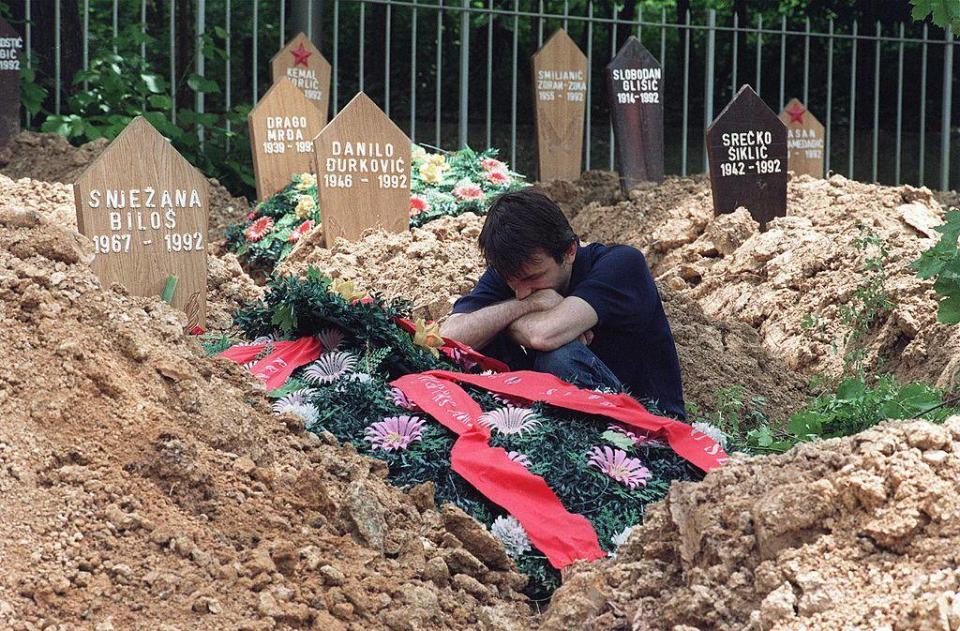Ratko Mladic has been brought to justice – but his atrocities should have been prevented in the first place
That Ratko Mladic has been sentenced to life in prison for committing genocide during the Bosnian War is good news indeed. It is too bad that it has taken more than twenty years for justice to be done. What is worse is that the international community failed to prevent his atrocities in the first place.
The break-up of Yugoslavia began in 1991, following swiftly on the heels of the end of the Cold War and the dissolution of the Soviet Union. The primary fear of Nato, the UN and other relevant international agencies at the time was plainly that conflict among the constituent Yugoslav peoples would spiral into a broader Balkan war – perhaps triggering violence in former Soviet satellites.
As a consequence, the international community stood by as Bosnia and Herzegovina, having declared independence, descended into chaos.
The viciousness of the war in Bosnia is hard to overstate. From the outside, viewed through television reports, it looked like a throwback. As the first conflict in Europe since the end of the Second World War, it seemed as if not much had changed in the style of warfare. Men with machine guns and mortars battled each other in woods and valleys; their camouflaged clothes and equipment making them seem like something anyone under the age of fifty might recognise only from a World War II film.
Yet it had not only the hallmarks of a war fought between soldiers, but also of a battle in which ethnicity and religion put civilians directly and deliberately in the line of fire. Rape became a widely used weapon, especially by the Serb side; deployed not only to cause psychological and physical terror but quite literally to disrupt the ethnic inheritance of the Bosniak people. Estimates suggest up to 50,000 women were raped, often multiple times.
By the time the conflict finally ended in late 1995, no side in the conflict could say that its forces had committed no war crimes. Dozens of individuals were convicted by the International Criminal Tribunal for the former Yugoslavia (ICTY) in the Hague.
Mladic, even as the war unfolded, had gained particular notoriety as he led a Bosnian Serb army of 180,000 men in their campaign against the country’s Croats and Muslims. He didn’t shy away from the TV cameras, nor from his belief that the war was a means by which the Serb nation could be returned to its rightful status – with a Greater Serbia rising from the Ashes of Yugoslavia. This would require what came quickly to be dubbed “ethnic cleansing”; and Mladic was happy to carry it out.
The massacre at Srebrenica was the nadir of Mladic’s brutality: up to 8,000 Bosniak men and boys killed in cold blood, despite the town being declared a UN “safe zone” and being guarded by Dutch peacekeepers. Some of those killed were handed over by the Dutch in exchange for the release of 14 peacekeepers, who had been taken hostage by the Serbs.

Mladic also oversaw the ruthless siege of Sarajevo. Over three years, his forces rained down thousands of shells, missiles and bullets onto the civilians trapped in the city. More than 10,000 died.
Even seven years after the war, when I first spent time in the Bosnian capital, it was a town in ruins. The old parliament building had been smashed to pieces; the offices of the famous Oslobodjenje newspaper were back in use despite remaining wrecked by bomb damage; the only buildings not pitted with bullet holes were those built after 1995. Smiles hid bad memories and not a few secrets.
Mladic at that time remained at large, aided by a friendly network in Serbia and the Republika Srpska (one of the two constituent entities which formed the post-war Bosnian state).
I remember having a debate late one evening in a bar in Banja Luka about why he and Radovan Karadzic (the civilian leader of the Bosnian Serbs) had not been turned in – I was promptly told to keep my voice down or risk being overheard (and dealt with) by drinkers who regarded the pair not as a war criminals, but as heroes.
It took sixteen years for Mladic, the “Butcher of Bosnia”, to be tracked down. In court he railed at the international judges – but now, at last, there was nowhere to hide.
His case was the ICTY’s last, and brings to an end the prosecutions of those indicted on war crimes charges. Yet the legacy of the Yugoslav conflict continues to haunt the region. The federal nature of Bosnia means it remains a country largely divided along ethnic lines, while Kosovo remains a disputed territory.
In the end, it was international intervention – both militarily, in the form of bombing campaigns by Nato, and diplomatically – which brought the wars in both Bosnia and subsequently Kosovo to a close. But for tens of thousands (if not hundreds of thousands), ceasefires came too late to save their lives. Millions were traumatised.
Entanglements by Western forces in foreign wars, especially in the Middle East, have made it fashionable to believe that no good can come from interfering in the murky affairs of far-off lands.
The experience of Bosnia – and the appalling crimes committed by men like Ratko Mladic – should make us reluctant to conclude that the international community should always stand aside.

 Yahoo News
Yahoo News 
